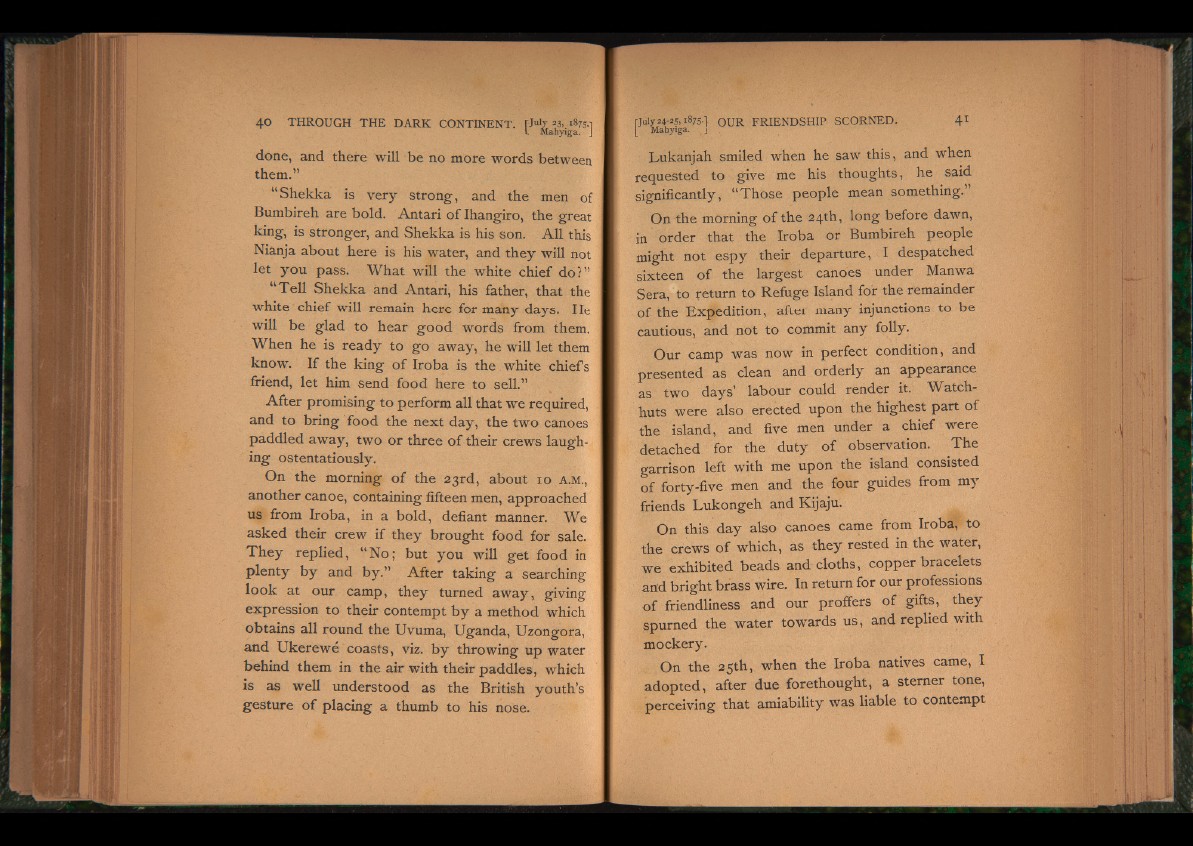
done, and there will be no more words between
them.”
“ Shekka is v e ry strong, and the men of
Bumbireh are bold. Antari o f Ihangiro, the great
king, is stronger, and Shekka is his son. A ll this
Nianja about here is his water, and they will not
let yo u pass. What will the white chief do?”
“ T e ll Shekka and Antari, his father, that the
white chief will remain here for many days. He
will be glad to hear g o od words from them.
When he is ready to go away, he will let them
know. If the king o f Iroba is the white chiefs
friend, let him send food here to sell.”
Afte r promising to perform all that we required,
and to bring food the next day, the two canoes
paddled away, two or three o f their crews laughing
ostentatiously.
On the morning o f the 23rd, about 10 A.M.,
another canoe, containing fifteen men, approached
us from Iroba, in a bold, defiant manner. We
asked their crew if th ey brought food for sale.
T h e y replied, “ No; but yo u will get food in
plenty b y and b y .” After taking a searching
lo o k at our camp, they turned aw a y , giving
expression to their contempt b y a method which
obtains all round the Uvuma, Uganda, Uzongora,
and Ukerewe coasts, viz. b y throwing up water
behind them in the air with their paddles, which
is as well understood as the British youth’s
gesture o f placing a thumb to his nose.
Lukanjah smiled when he saw this, and when
requested to give me his thoughts, he said
significantly, “ Those people mean something.
On the morning o f the 24th, long before dawn,
in order that the Iroba or Bumbireh people
might not espy their departure, I despatched
sixteen o f the largest canoes under Manwa
Sera, to return to Refuge Island for the remainder
o f the Expedition, after many injunctions to be
cautious, and not to commit any folly.
Our camp was now in perfect condition, and
presented as clean and orderly an appearance
as two days’ labour could render it. Watch-
huts were also erected upon the highest part o f
the island, and five men under a chief were
detached for the duty o f observation. The
garrison left with me upon the island consisted
o f forty-five men and the four guides from my
friends Lukongeh and Kijaju.
On this day also canoes came from Iroba, to
the crews o f which, as th ey rested in the water,
w e exhibited beads and cloths, copper bracelets
and bright brass wire. In return for our professions
o f friendliness and our proffers o f gifts, they
spurned the water towards u s , and replied with
mockery.
On the 25th, when the Iroba natives came, I
adopted, after due forethought, a sterner tone,
perceiving that amiability was liable to contempt